#1940s nurses
Text
I’ll Get By
A/N: There are things I’m bound to get wrong about the 1940s and asylum’s, so please forgive me. There was also a lot of prejudice for people especially if they were gay, and there is a gay patient mentioned in the first chapter. If you’re uncomfortable with it please don’t read. Thank you!
Part 1: An Anomaly
1946 — St. Catherine’s Asylum
The heavy coating of stagnant rain water on the streets had nearly taken you out the moment you stepped onto the stone staircase of the building. The breath had been ripped from your lungs the moment you felt your feet slip.
You squealed in surprise and if it hadn't had been for the railing, you would have fallen on your backside. After righting yourself and fixing the starch nurse’s uniform you were deemed to wear, you unfurled your nearly broken umbrella and carried on.
You were rushing this morning, rushing into the front door of the asylum with your nurse's bag bouncing against your hip. Once you stepped through the door and shook off the umbrella twice, you had blown a curled piece of your hair out of your face.
“Close that damned thing right now!” One of the patients lingering near the door smoking—seemingly unbothered by the nurse who was supposed to be watching him—barked a demand. “Don’t you know opening an umbrella indoors is bad luck, you daft girl!”
You could have responded with ire at the man wearing faded blue pinstriped pyjamas, many other nurses had. I like other nurses, you knew he wasn’t mad, you knew he wasn’t the kind of man who lost his mind over drink or injury. He was a man who was stalwart in his sexuality and attraction to men, and for that, he was committed.
“Good morning, Mr. Samson.” You closed the umbrella and folded it up, adhering to his superstitions while offering him a small smile.
Mr. Lyle Samson was a man with streaky black hair and rather odd coloured eyes—one almost iridescent blue and the other brown—a crooked nose from it being broken, and thinly pressed lips. He was a cantankerous man, one who had grown more ire-some from the treatment he had received in the asylum. The doctors held little care for the patients, even less for men like him, and as it was, he had suffered as well at the hands of his family.
“Your lipstick is a mess, girl. Fix yourself.” He lifted the cigarette to his lips, inhaling the Camel brand smoke and exhaling from the side of his mouth. He had glanced you over, once more, before he extended his hand and clutched onto your wrist. He squeezed once then relaxed and squeezed again, a telltale signal he had used when he wanted to send a message.
“There’s someone new.” He mumbled under his breath, inching forward while staring you down with his blue and brown eyes. “A famous fella.”
“Famous?” You looked past him to the first floor nurses station, toward the nurse who was disposed to be monitoring him. “Someone famous?”
“Used to be, before the damned shit-hole government stripped him of his title.” He turned his head and spat a few inches from your feet, the aftermath of sucking back a Camel cigarette. “He’s in the men’s ward, hates the doctors.”
“Mr. Samson, smoke is over!” The haughty nurse who had been on monitoring duty for the Lyle Samson started her approach. You could hear the clack of her heels on the aged and worn wood floor, the heady stride of her feet as she rushed toward him.
You knew that atmosphere wasn’t kind to men like him, men who hadn’t wanted a traditional life that fit society’s norm’s in the 1940s. He was a man who was attracted to men, and for that, he was punished by both the authorities and his family.
“He’s fine, he was telling me about a new patient—“ you rose to his defence, vocally, and had immediately been chided by the nurse.
“He is not fine.” Her voice darkened, and her eyes narrowed explicitly toward you with a tempestuous manner. “He is finished his cigarette, and you need to head to the men’s ward.”
Your breath had hitched in your throat, your hands tightened around the handle of the umbrella. Your nails dug into the varnish of the wood, though not deep enough to leave a mark, your mind immediately racing. The men’s ward was no nurses’ top choice when doing their rounds, and there was often a lack of willing volunteers. For you to be assigned to the men’s ward, you knew it was some kind of hazing because you were the newest.
They would hand you over to the men on a silver platter, leaving you to the men, who were frequently mad and violent. While there were some who were left solely on lockdown and very rarely got to spend time in the common area, others were left to roam—within reason. You had spent time in the children’s ward, which was a close second to the least desired floor, and the least amount of time on the women’s ward.
“Me—“
“I don’t have time to argue, Nurse L/N.” She cut you off with a stern and harsh bite, directing her inability to care beyond base empathy toward you. “Now.”
Your feet carried you in a rush, moving you near the staircase that led to the men’s ward. You nearly tripped over your feet before you had even taken the first step. Your hand rest upon the wooden railing that would take you up the winding staircases. You would wander through doors that were locked every night until you got to the fourth floor, which was where the men’s ward was.
The asylum was laid out in 5 massive floors that extended through winding hallways that were dimly lit by old windows. On the main floor was the receptionist’s and the warden’s office. The doctor’s offices for the children’s and men’s ward were on the main floor, unlike on the women’s floor. The doctors themselves had no special interest in spending more time than what was necessary in those areas.
The women’s unit was on the third floor above the laundry, kitchen, medical examination and treatment rooms on the second floor. Next had come the children’s floor that was not nearly comforting enough for kids left behind or admitted. The fourth floor was dedicated to the men that were admitted and held in their own contained unit, like the children.
And then there was the fifth floor that was exclusively held and dedicated to the incurables. They were the men, women, and children who were so manic and wild, deemed impossible to fix, that they should be locked away and forgotten about. Lyle Samson was unfortunately going to be moved to the incurable’s floor after Doctor Rollins had determined his sick pleasures could not be fixed, and all attempts were feeble.
“The men’s ward…” your feet carried you slowly, every step felt as if there was an ounce of lead sewn into your flesh.
You moved through the staircases from floor to floor, starting from the main floor to the fourth. You stopped at the double set of wooden doors with frosted glass. The lettering for the men’s ward was scrawled in faux painted gold—a decorative addition to make people believe that this place wasn’t as nefarious as it actually seemed. You reached up and placed your hand upon the wood and pushed slowly, just enough to be able to slip through the door and into the ward.
The door felt heavy behind you as it shut with a bang, the force tipping you forward. All the weight of your body shifted to the front of your feet, more specifically your toes. You had nearly toppled, almost flailing entirely, until you felt a steady hand on your arm acting as a support pillar. However, you were soon to learn that it wasn’t just one hand on you but another, a large warm hand on the small of your waist that was immediately followed by a voice.
“The door always sticks,” you could only describe the voice as honey-laced whiskey, something deep and smooth but afflicted with a weariness, “you’re not the first nurse it’s nearly knocked over.”
The honey-laced whiskey voice belongs to someone you’ve never possibly imagined would be in a place like this. The man whose face was plastered across magazines—who had comic books created about him and had even starred in movies to stir the morale of the country during the war—was standing so close to you, you could see the green in his blue eyes.
His blonde hair was brushed out of his face and styled like you’d seen so many times before. There was a firmness to his jaw that allocated your attention before it was quickly drawn to the rest of him. His shoulders seemed unnaturally broad, and his chest was firm, despite the starchy grey uniforms the patients wore. You could easily detect the size of the American hero who had liberated men in Europe, and saved thousands.
The hero, who had been a beacon of light and hope, was squandered after the war. The papers called him mad with grief, a man who had seen the horrors of war and lost all sense of self. It happened after he had lost one member of the unit he led. The Howling Commandos lost Sergeant Barnes, or Bucky as he was known as, and Captain Rogers was never the same.
Although standing here now, looking at him as he held you steady after you nearly fell, you see none of the madness he was accused of. There was nothing whatsoever in his blue-green eyes to make you think he was mad enough to be here.
“Thank you…Captain Roger’s…” you spoke with hesitancy and the sound of your voice was enough to break the spell he had you under. In a moments notice, you’d been called to the nurses desk, breaking the firm yet gentle hold he had on you.
You turned your back to him and fixed your nurses cap, only recognizing his eyes on you when you felt heat starting to grow in your belly.

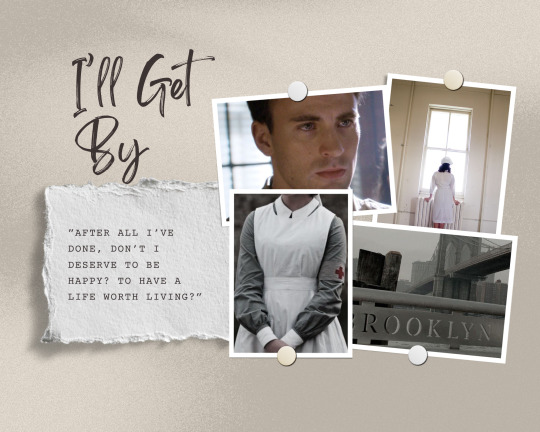
#I’ll Get By series#I’ll Get By#I’ll Get By Masterlist#asylum!Steve Rogers#asylum!Steve Rogers x nurse!Reader#1940s!steve rogers#1940s!Steve Rogers x nurse!Reader#Steve rogers x nurse!Reader#Steve rogers x reader fluff#Steve Rogers x reader smut#Steve rogers x reader angst#Steve rogers x reader imagines#Steve rogers imagines#steve rogers imagine smut#Steve rogers imagines fluff#Steve rogers imagines angst#Steve rogers imagine fluff#Steve rogers imagine angst#1940s au
70 notes
·
View notes
Text
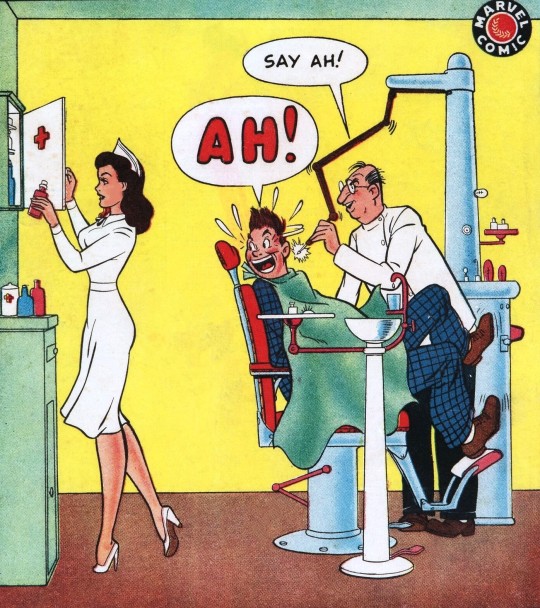
Nellie the Nurse - art by Stan Goldberg (1949)
108 notes
·
View notes
Photo
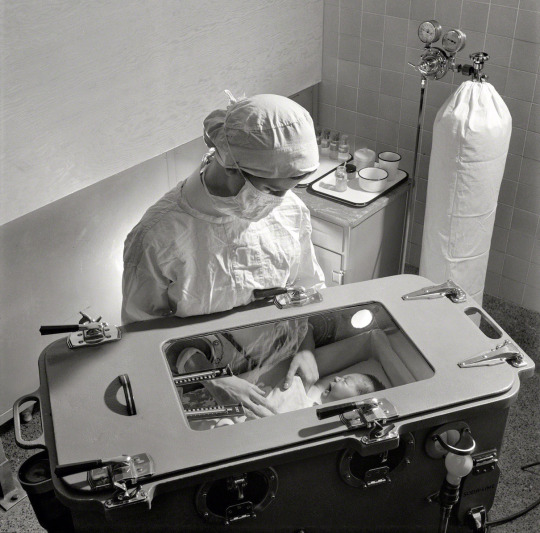
"Babies' Hospital, New York. Care of prematurely born babies is one of the most complicated procedures which must be learned by the student nurse. Feeding, bathing and diaper changing are carried on inside the incubator, in which temperature, humidity and oxygen must be carefully regulated. The oxygen tank can be seen in the background." Photographed March 1942 by Fritz Henle.
205 notes
·
View notes
Text

U.S. Cadet Nurse Corps, 1942
#nurse#women in the workplace#united states#propaganda#war#world war 2#1942#1940s#vintage advertising
140 notes
·
View notes
Text
vintage side of tumblr!
recently I stopped by a magical shop and picked up a 1940s nurse's cape for 20$. It is AWESOME!
I have a question though! It's got lettering on the collar and I'm curious as to what it stands for and all google will do is try to sell me other capes instead of giving me helpful facts. So I come to you, vintage costume/clothing side of tumblr. Help me in my hour of (curious) need please! Where has my fancy cape been?

picture of said fancy cape in full

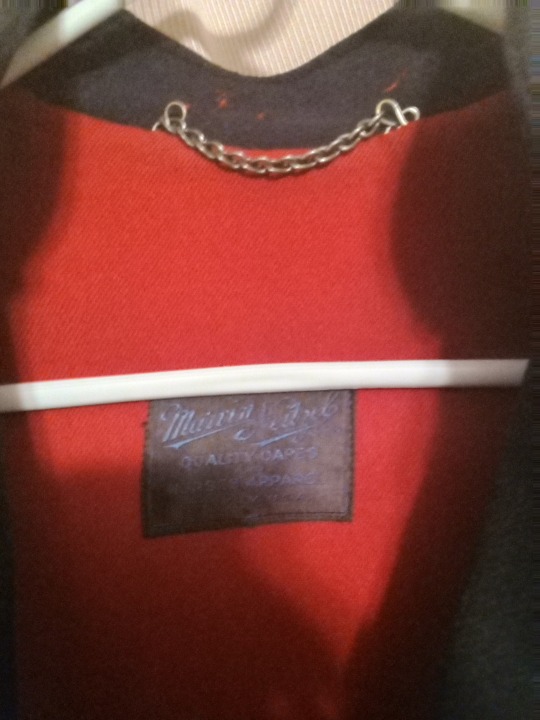
its even got pockets! (or - one pocket but still I am pleased)
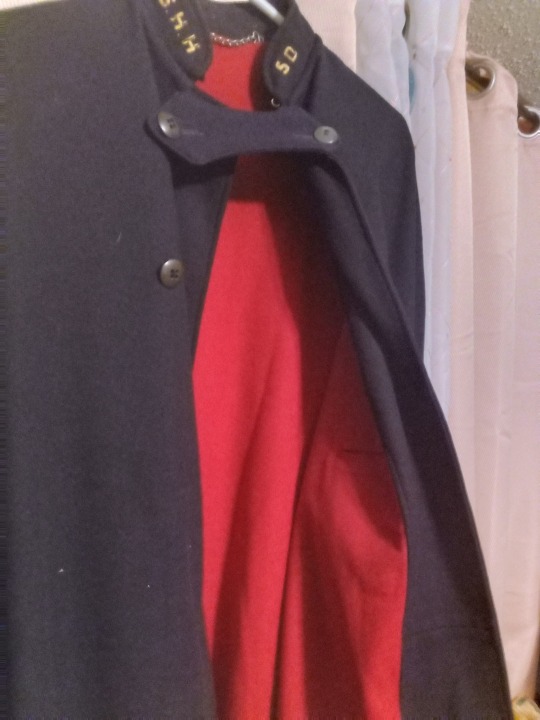
it goes all the way down past my knees and matches my US Navy peacoat from the 60s. I'm delighted.
reblogs please! I don't know that I've got many vintage wear followers but I do not doubt that some of my followers (or their followers) do!
60 notes
·
View notes
Text
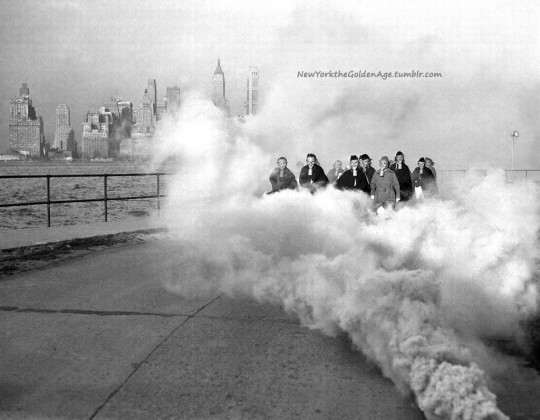
Army nurses, at their post at Fort Jay, Governors Island, wear gas masks as they have a civil defense drill, November 27, 1941.
Photo: Associated Press
#vintage New York#1940s#World War II#civil defense#civil defense drill#gas drill#Governor's Island#Nov. 27#27 Nov.#nurses#Fort Jay#vintage NYC
42 notes
·
View notes
Photo

WWII 40′s style pin-up
249 notes
·
View notes
Text
Lilla Thornton (Masters of The Air OFC)
Note: A little introduction to my newest original female character for the Masters of The Air universe. Look out for all her adventures in the weeks to come.
Word Count: 895 words.
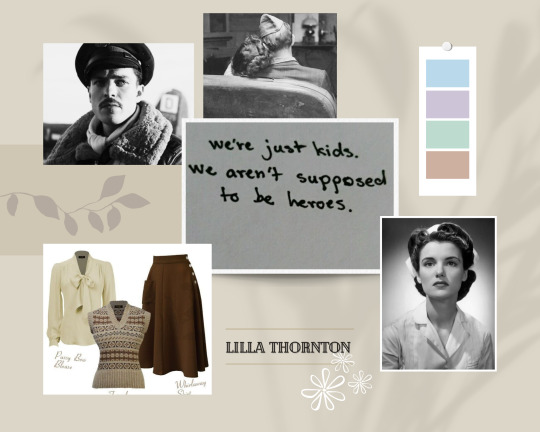
Glass plasma bottles clicked against each other as they moved inside the chipped wooden crate marked "Medical Supplies". Pyramids of morphine syrettes threatened to spill with every second step heavier than the opposite. In a different setting, desperate hands would be grabbing at the morphine, like kids to a bowl of candy. It was a highly sought-after substance on the frontlines by medics, but in the ghostly quiet hallways of the on-base infirmary, no one dared to steal from what supplies graced the stockroom.
In the middle of the infirmary's hustle and bustle lay a heavy oak desk, out of place and odd for its surroundings but very fitting for the occupier who worked upon it, hour after hour.
Thud! Rattle! Clunk! The wooden crate came to rest upon the paper-laden desk as dainty hands rifled through its contents, determined to find the item that she so urgently needed.
"Ah-ha!" the gentle rasp with a Texan accent piped up as she grasped what she was looking for in her left hand. "There you are, you little rascal."
"Still talking to the medical supplies, I see."
"You know me, Nora. If a seasick-riddled boat journey across the pond can't change my ways, it will never happen," Second Lieutenant Thornton chirped as she turned to stand before the friendly face.
Lilla Thornton was a petite girl from Fredericksburg, Texas. Although she was small in stature, she had a big personality. As head nurse, the tiny Texan often had to drum up morale as her fellow medics worked tirelessly on wounded men evacuated from the battle-damaged aircraft returning from missions into occupied Europe. It was almost like working on a production line; as soon as a patient was stable, they'd be moved to a more suitable bed within the infirmary, away from all the chaos.
A no-nonsense kind of girl, Lilla was known for throwing herself into her work, placing it on top of her list before pleasure. Her time at Thorpe Abbotts was a perfect example of this practice. As her nurses clung to the men of the 100th every Friday at the Half Moon Inn, the young Lieutenant would spend her night taking stock of supplies and rolling bandages. Even back home, she'd rather spend her weekends studying or helping her father run the family ranch than travel the hour into Austin to go drinking and galavanting with her friends.
Growing up, she had to learn and take responsibility more quickly than most girls. At the age of seven, her dear mother Tabitha passed suddenly of an unknown illness that doctors were trying to grasp a better knowledge and understanding. Lilla was the eldest of three siblings, meaning any extra time she had after her classes were finished was spent working to bring in extra money to aid the family finances.
Her father, a cripple who couldn't work, always encouraged the brunette to follow her heart, and on the 18th of August 1941, Lilla Thornton joined the Army Nurse Corps. With a passion for helping those in need and a hard-working ethic, Army life came as easy as learning to crawl as an infant.
Training started at Brooke General Hospital, San Antonio, Texas, before she was assigned to the Eighth Air Force as a breakaway unit in September of 1942. A single gold bar sat proudly upon the collar of her dress uniform and the new role of head nurse upon her shoulders.
At Kearney Army Airfield, Nebraska, Lilla made friends with a fellow nurse from Louisiana. Like Lilla, Nora was a serious person putting just as much dedication into her role as a nurse as the Texan girl did. Nora and Lilla forged a friendship that would stand the test of time.
Thrusting the two bottles of saline towards the medic, followed by some syrettes of morphine, Lilla raised an eyebrow in question at the female before her.
"This should be more than enough for now. You don't happen to have any chocolate in your magic box, Lieutenant Thornton?" Nora’s Southern drawl emphasized certain words as she asked the smaller female.
Holding up a finger, Lilla turned and began to search through a heavy oak drawer connected to her desk before producing a foil-covered article. Chocolate had become a rare commodity, especially with all the rationing the Americans faced while living in England, and what they could get a hold of tasted far from what they were used to back home.
"This is my last ration for this month. It better be for a good reason you’re looking for some. You owe me one, Nora."
"You got my word, Li. If you have the time, can you check on Lieutenant Payne? I think he's coming down with pneumonia."
Looking up from her clipboard at the mention of one of the navigators, Lilla nodded. It was apparent there was some kind of bug going around the base. She’d already treated a few men with similar symptoms.
"I don't have long left until I've finished my shift here, but I'll be round as soon as possible. Just make sure he's kept warm until I get there."
Returning her attention to the crate of supplies, Lilla sat down behind the desk to begin the final stock check of her shift.
#hbo war#masters of the air#rosie rosenthal#original character#original female character#lilla thornton#lilla thornton x rosie rosenthal#masters of the air fanfic#masters of the air original female character#nix writes#OFC#ladies of hbo war#1940s character#women's army nurse corps
16 notes
·
View notes
Text
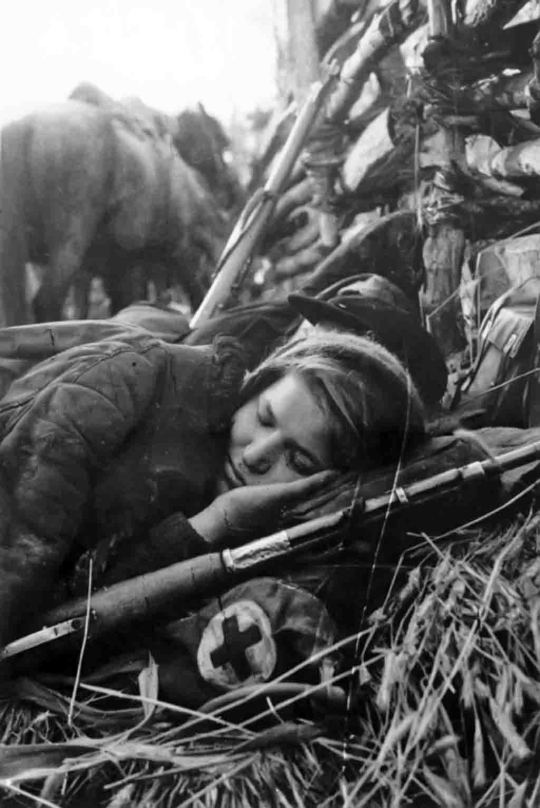
Infirmière soviétique - Front de l'Est - 1940's
#WWII#front de l'est#eastern front#armée soviétique#soviet army#armée rouge#red army#femmes dans la guerre#women in war#infirmière#nurse#1940's
15 notes
·
View notes
Photo
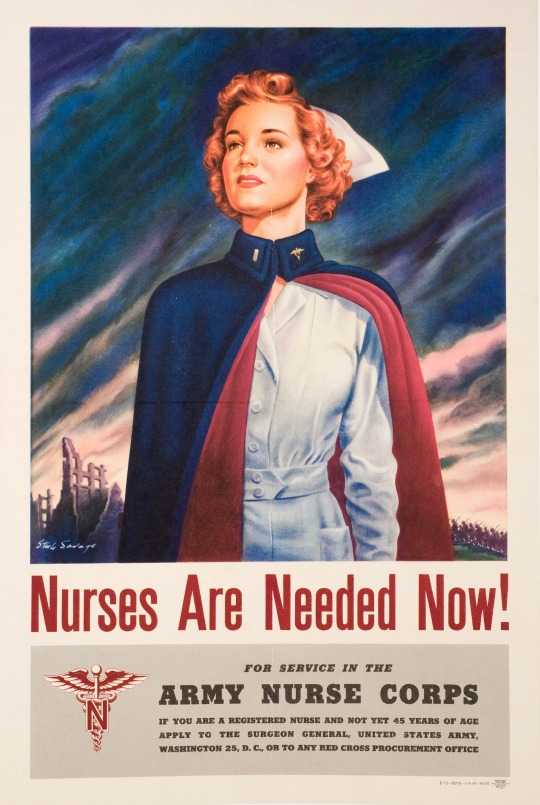
Nurses Are Needed Now! by Steele Savage, 1944
#nurses are needed now#steele savage#1944#1940s#vintage#poster#poster art#art#illustration#nurse#wwii#world war II
144 notes
·
View notes
Text
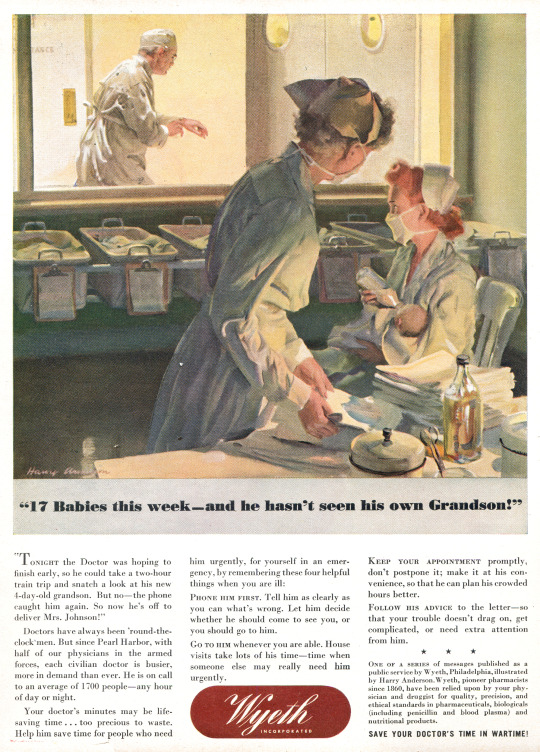
"Well, if he'd kept it in his pants none of us would have had a problem."
Parents Magazine - June 1944
#1944#doctor#nurses#vintage ads#vintage ad#advertising#advertisement#1940s#1940s ad#1940's#1940's ad#funny#humor#humour
5 notes
·
View notes
Text
I’ll Get By
A/N: There will be things that I get wrong/may not be historically accurate, please forgive me!
Part 2: The Small Things
1946 — St. Catherine’s Asylum
The fall swept in with a whirlwind and just as soon as it had approached, it felt as if it would be overshadowed by winter. There was an overlying sense of dread for the winter to come, if the 1946 Farmer’s Almanac was right. The winter was set to be cold, with heavy snow headed for NYC and the surrounding areas.
But it wasn’t the weather that you wanted to focus your time on, or your thoughts. There was something much more important bothering you, or rather someone. The news that Lyle Samson told you about the celebrity in the asylum had made you take a pause when you first heard him say it weeks ago. And in the few moments following his whispered secret, you found out it was Steve Rogers.
Captain America himself, the hero that had saved thousands of people being in the St. Catherine’s Asylum—for the feeble-minded as it was called—was as shocking as it was mystifying. There was a countless amount of heroism that was thrown aside just as he was thrown into the cursed building.
The things he had done in the war, and likely had seen, could have driven him crazy if he actually had a weak mind and yet, it seemed as if he was anything but. Aside from the lifetime guilt that would likely plague him from the loss of his friend in the war, his mind had seemed sharp.
It was intrigue that made you search for the cause behind his place in the asylum, on your days away from the cursed building. With the very few resources you had as a woman in 1946, struggling in a Brooklyn apartment that left little to be desired, you had attempted to feed your curiosity. It wasn’t just the resources that you had lacked in, it was a lack of opportunity to talk to the man himself.
The action of the nurse who had put you on the men’s ward to begin with, had been rectified by Dr. Rollins, who had removed you from that floor. It had felt as if you were in limbo between working in the direction that the lead doctor had wanted you to go in, and being hazed as the newest nurse. Those with seniority had often sent the new nurses to the men’s wards, fully knowing that their outside contact with women was limited.
It was a prospect that was anxiety inducing for the newer staff members, as you’d heard from a few other nurses working in that ward. The men were maddened by the asylum themselves or the newest treatments that Dr. Rollins had wanted to inflict on the patients.
You’d wondered if the treatments themselves weren’t the root cause for their mental state, treatments like electroshock therapy or even lobotomies if Dr. Rollins thought the case called for it. You had never bared witness to the treatments themselves, rather you had been assigned the task of giving medicine, taking blood or delivering the patients’ meals.
As it was, you had served a single shift on the men’s ward, being you were placed on the children’s floor. There was almost something more debilitating about seeing the children, young and innocent faces locked behind their doors, that ate at your insides. Those small children, those poor innocents left behind by parents or ripped from their homes by people who thought they knew better….
You hated the children’s ward more than you hated the men’s ward. There was such a lack of genuine care by some nurses, who had likened themselves to being babysitters for those little girls and boys, rather than caretakers. For weeks, you had done your best to extend all the kindness you could afford to them, while inherently feeling sickened by their treatments.
It was near the end of October when you had finally convinced Dr. Rollin’s to place you back on the men’s floor. The request itself seemed to turn his head and garner his curiosity, since most nurses would rather avoid the men’s ward at all costs. For you, for your ability to try to sleep at night, you could not be around children when the staff didn’t care about them. Your heart broke for those children, for everyone who was left abandoned in the care of those who treated them like a problem.
The children, who were most vulnerable in the entire asylum, had been treated the worst. There was a deep deposited hurt in your heart and soul that made you incapable of being able to find rest late at night. Insomnia had afflicted you in the quiet hours of night in your Brooklyn apartment, where you would toss and turn. Your mind was an impossible thing to turn off, as you thought about the patients you had come to know.
And the ones you wanted to know.
It had taken weeks for you to be placed back on the men’s ward. When you had gotten placed back on the floor, you were determined to treat them like the patients were people and not animals. The first day back on the men’s ward had started with an opportunity for enrichment for the men, a chance for them to get out of their rooms and do something with their time.
Although the task was simple—a chance to draw or sketch with charcoal pencils and cheap sketchbook paper—it was enough to occupy them. You were assigned the task, with one of the other nurses, of looking over the men as they sat in a large, somewhat airy room.
There was nothing but chairs that had faced the front of the room with sunlight streaming through dirty thin glass panel windows. The nurse assisting you with the task was as uninterested as you had imagined, choosing to take her time writing a letter to her lover, rather than care for the patients.
“They’re sketching, they won’t do anything.” She had quipped with a disinterest when saddling you with handing out the charcoal pencils and sketchbooks. She had preoccupied herself with the pen she had twirled between her fingers, and the smoke in her other hand that was lit yet not used yet. “Go!”
The temptation to speak what was on your tongue, a curse you’d wished you’d had more bravado to speak, had died quickly. Regardless of you being a nurse during the latter years of the war, the lives you had tried to save when they came to the hospital you were assigned, you felt like she was scolding you like she would a child. There was nothing you could have said currently to her, not with these men watching the two of you, and any aggressive attempt would only unsettle them.
You silenced yourself and started passing out the charcoal pencils and sketchbooks, working your way toward the back of the large room. With each passing second, you had been aware of the eyes on you, the men who were watching you. There was a level of unease around the room, a certain amount of tension from the patients, who had very obviously been aware they were outnumbering the two of you.
And yet as you approached the back of the room, the last chair and patient to receive a sketchbook, you’d felt your heart stop. Like the first time you had seen him, Steve Rogers was undeniably captivating. His blonde hair was messily brushed out of his face, and his blue-green eyes had once again made you forget how to breathe. He was a national hero, and his placement here in the asylum seemed to be completely improper for someone like him.
After everything he had done, after everything he had given up to save lives, he was thrown in here? To be forgotten and thrown aside? It seemed like such an injustice for him, to have him give everything and be locked in here.
“Thank you,” his deep voice was husky and alluring, and there was a moment when his hand brushed against yours, “nurse L/N.”
Electricity like you’d never felt before had passed from his hand to yours, further enticing you in a manner that felt impossible. Your tongue felt as if it was swelling inside your mouth with the inability to utter a single word, and with a stark nod, you turned on your heel and walked away.
**************************************
Your tongue had betrayed you. Your tongue and brain had both left you, faltering in a moment when you could have spoken to him. And it was a regret that you had carried with you late into the afternoon. With the inability to communicate despite your desire to ask him, even if it wasn’t your place, you thought you had squandered your opportunity.
And yet, as the medications were being handed out in the afternoon, it seemed as if a second chance was given to you. The same nurse you had spent the enrichment time with—wherein you handed out art supplies, and she did nothing—had left the room to belong to Steve Rogers with a harsh huff. The door slammed heavily behind her and her heels clacked angrily against the aged floor, the wood grain in desperate need to be sanded down and stained to look fresh.
“He wants you,” the nurse in question had slammed the clipboard down upon the nurses’ desk, her ire focused solely on you, “he won’t allow anyone else to administer his medication.”
The paper attached to the clipboard was dusted with small ink stains from her pen that had dripped from the leaking tip. On the top of the rudimentary chart was his name in black boldened letters, STEVEN GRANT ROGERS, with a complete lack of the title he had earned. There were notes on his attitude for Dr. Rollins, and perhaps people outside the asylum interested in the great America hero, however nothing new was added for today.
“Why?” You had already started rising to your feet, your hands reaching for the clipboard and your fingers curling around the thin side.
The edge dug into the creases on your palm, and your eyes had swept across the aggressive scowl of the nurse before moving toward the small rolling cart beside her. The tools needed to draw blood were set upon the metal surface, as well as the small white pills that Dr. Rollins deemed necessary. Besides the medication and the tools needed to draw blood, was a simple book—something he must’ve requested.
You could hear your heartbeat in your ears while you pushed the rolling cart toward the door of his room, the clipboard and rudimentary chart on top of the book. You only had to knock once to announce yourself and as you pushed the cart into the room, you closed it softly behind you.
There was nothing out of the ordinary about his room and he was given nothing the other patients did not have—a basic metal bed that seemed as if it was too small for him, an uncomfortable looking mattress, cheap sheets made from thin cotton, and the usual grey uniform.
In the corner of his room was a small selection of books, and to the left of the books were previous sketches he had done. Although most were landscapes that must have come from his recollection, many that you had not known yourself, the Empire State Building was the only monument that you had recognized. Its likeness was uncanny. So much detail had been captured by a simple charcoal pencil, it felt as if you could reach out and touch it.
You had been blindly captivated by the sketch, so much so that you hadn’t been able to address him. Not about the request to have you, and you alone, administer his medication, nor could you question why he was here. Your eyes were fixated on the sketch of the infamous NYC building, and then on every one after until the shift and creak of the bed had stirred you from your focus.
“Captain Rogers—“ you had begun to speak, reaching for the chart and setting it aside in favour of grabbing the needle. Your hand hovered above the tie for his arm and the vial for blood, as you took another pause that was triggered by him speaking over you.
“Steve,” he corrected you and switched positions, coming to sit on the edge of the bed with his left sleeve rolled up past his elbow, “they stripped that title from me.”
You were rendered silent again, only observing him as he was observing you. There was silence, but it wasn’t stagnant as you expected. There was a soft, lingering kind of tension as neither of you had really moved, and you were left to process the news he had given to you. You hadn’t heard anyone address him as the captain that he once was, however you had always thought it was by his choice. You hadn’t expected that it was involuntary, or an action that he had no control of.
“Oh.” It was a single syllable that you had let slip from your lips, one that had broken the silence before you had cleared your throat and shook your head.
The curls in your hair, deemed necessary as part of the uniform and the style that continued before and post-war, had hit your cheeks. Your lips were stained with the unwavering victory red that women had clutched to during the Second World War—which, along with heels and the starch white nurses’ dress, was part of your uniform—had become pursed.
“I’m sorry.” You relayed your emotional state through two words, and then you had mentally shaken yourself to do your job. You grabbed the tie that would go around his arm and lifted it from the metal rolling table, twisting it around your fingers before you straightened it out again.
You took two small steps toward the bed and cleared your throat, raising your head, only for his iridescent eyes to capture yours again. Warmth was instinctually present deep in your heart and soul, akin to an endearing glow from a flickering candle that lit up the surrounding room. You didn’t even have to speak before he extended his arm, and you were already leaning in, drawing the tie around his arm.
“I’m sorry if this hurts,” your voice was soft and there was a hint of a tremble hanging on to the edge as you preemptively apologized for the needle you hadn’t even used yet. You tied the knot to get a good vein, and then you reached behind you for the needle and vial, balancing them in your hands before you bent down to get a good glimpse at the vein.
“You’re nervous,” Steve’s voice had once again drawn your attention away from the needle, and his hand had reached toward you to steady your own. “You won’t hurt me, Y/N.”
Another jolt of electricity passed from his hand to yours, and back again. You were well aware of the lingering staleness that seemed to be ever present in the asylum, the smell of mustiness that seemed to be caked onto every surface possible. And it seemed to be less of an irritant in the room, or maybe there was more to focus on than the stench.
“Are you afraid of needles?” You took a slow deep breath to calm your racing heart and jumpy nerves, before you finally managed to push the tip of the needle beneath his skin into his vein. As you started to draw blood from him, he had answered your question with a very subtle shake of his head; however, there was something else on his mind.
“I know you want to ask why I’m here. Most of the nurses here have asked.” His eyes searched your face as if he were committing every feature, every single thing about you, to some corner of his mind. “They tell me I’m crazy.”
“You’re not crazy.” You recoiled once you had filled the vial and pushed the cap on, standing upright and replacing it on the metal tray. “I’ve seen crazy…”
You wanted to ask why he wanted you to be the one to give him his medication. You wanted to ask why he was refusing any other nurse and yet, you hadn’t been given the chance. There was sparsely a moment for you to say anything else before the door opened with a high-pitched squeak. Steve’s green-blue eyes had drifted away from you to the presence of the person behind you, and you immediately noticed the tension in his jaw.
“Nurse L/N,” Dr. Rollin's voice had hit your ears producing a tentative shudder that had run down your spine, “nurse Hattie had mentioned you were requested.”
You could count the seconds down in your mind before you felt a hand on the small of your back as Dr. Rollins approached the bed. The feel of his fingertips against the starch white material of your nurses’ uniform provided no form of comfort or even anything akin to friendliness. The touch made you want to recoil, and the warmth from his body was almost twisted and nausea-inducing. Your heart clenched, and you understood your mind was telling you to run, to get out of this space immediately.
“You cannot turn away the other nurses who intend to help you, Mr. Rogers.” The complete lack of empathy was evident in Dr. Rollin's voice, as was the blatant choice to not address him as captain. “Nurse L/N is not always available—“
“You haven’t given me my medication yet, nurse.” Steve was blatantly ignoring the doctor, choosing not to acknowledge him at all as if Dr. Rollins was no more than a ghost.
“Medication?” You turned your head, cutting yourself free from the daze that was afflicting you. Once you were freed from the tentative hold Steve had on you, you cupped the pills in your hand and held them out to him.
“Give him the pills and leave, nurse. Mr. Rogers and I need to have a conversation.” Dr. Rollins had addressed Steve with an air of superiority as well as the attempt to hold power over him.
You placed the pills in Steve’s palm, watching him dry swallow them, and then you were sharply turned on your heel. Dr. Rollins turned you away from the bed and Steve, ushering you out of the room with a heavy hand. When the door closed behind you with more force than necessitated, you took a single look over your shoulder. You took a quick glance, and then you moved back to the nurses’ desk, sitting on the wooden chair and exhaling slowly.
Only then had you noticed the feel of something in your pocket. You slipped your hand into the pocket of your nurses’ uniform, feeling sketchbook paper. Your hand recoiled with the paper in hand, and you unfolded it slowly and carefully, your eyes taking in the image you admired so much. The Empire State Building was there laid out in charcoal pencil, perfectly captured had been slipped into your pocket without you even knowing.
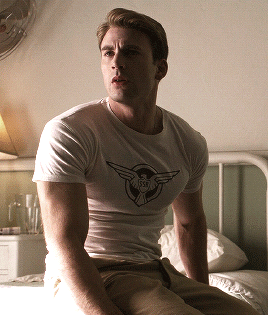

#asylum!Steve Rogers x reader#asylum!Steve Rogers x nurse!Reader#Steve rogers x nurse!Reader#steve rogers x reader angst#steve rogers x reader imagines#steve rogers x reader fluff#Steve rogers imagines#Steve rogers imagines angst#steve rogers imagines fluff#Steve rogers imagines smut#Steve rogers imagine#steve rogers imagine fluff#Steve rogers imagine angst#Steve rogers imagine smut#1940s!steve rogers#1940s au#1940s#I’ll Get By series#I’ll Get By masterlist#I’ll Get By
35 notes
·
View notes
Photo

Source details and larger version.
Timely: from cursed clocks to wind-up dresses, clock imps to clocks with faces, here's my collection of vintage timepieces.
15 notes
·
View notes
Photo
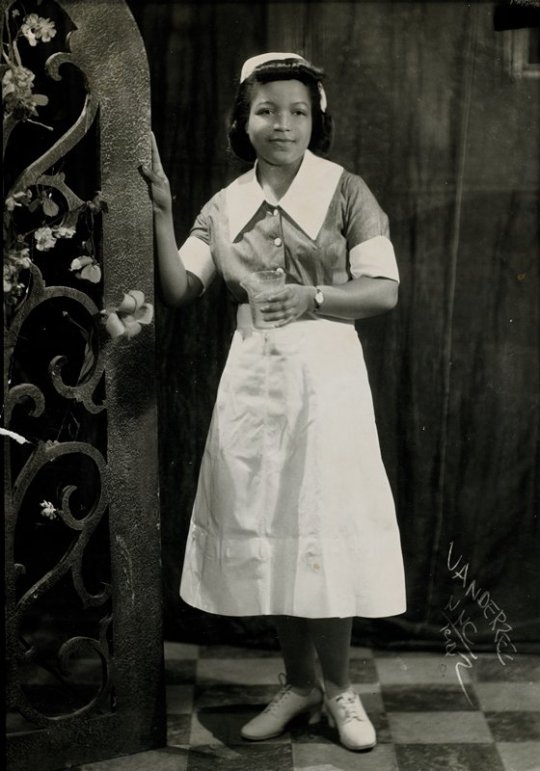
Nurse, James Van Der Zee, 1942
#nurse#James van der zee#van der zee#1942#1940s#1900s#20th century#photograph#photography#photo#art#harlem renaissance
16 notes
·
View notes
Photo
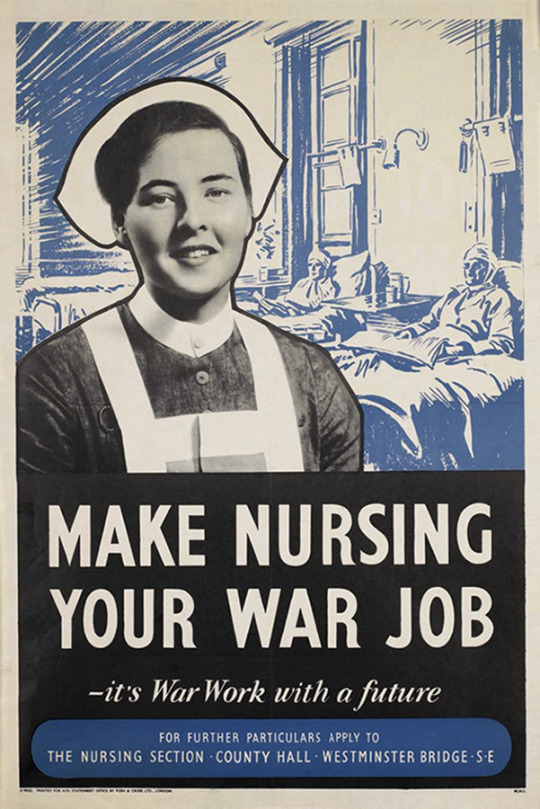
The Nursing Section, 1940s
Theme Week: Women in the Workplace 👩⚕️
#ww2#world war 2#war#nurse#women in the workplace#1940s#british#united kingdom#propaganda#vintage advertising
72 notes
·
View notes
Photo
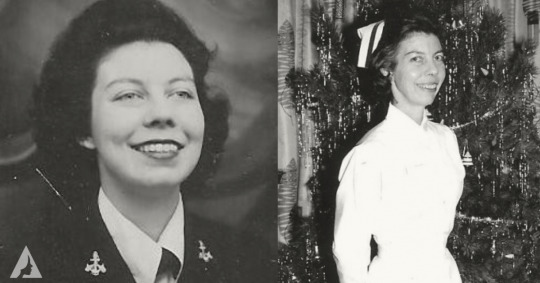
Those who help others are truly special. Maggie Eloise (Cliatt) Spaeth (1922 - 1982) was one of those special people.
Trained as a nurse, "Eloise" developed pleurisy and had to stop nursing. She then joined the WAVES (Women Accepted for Volunteer Emergency Service) to help in the World War II effort, and afterwards went on to become a waitress, electronics student, and newspaper writer. Twenty five years later she returned to nursing in an Emergency Room.
As her descendant, Benae, who shared her biography, stated: "She was known for quietly helping people in need." Thank you Benae, for sharing about Eloise so that she is always remembered on AncientFaces.
20 notes
·
View notes